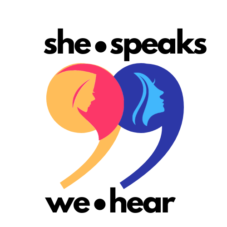In late 2021, I attended Who Is Hussain London’s inaugural She Inspires Me conference in London. The event focused on the impact of women in the fight for social justice, including the crucial work that women are doing in the humanitarian space.
Here are my key takeaways, including some thoughts on how the key messages from the event impact the work we are doing here at She Speaks We Hear.

Who Is Hussain – a global people-powered movement
Who Is Hussain is a grass-roots people-powered organisation. Taking inspiration from Hussain ibn Ali, the grandson of the Prophet Muhammad (pbuh) who fought injustice and oppression at the historic battle of Karbala, Who Is Hussain empowers communities to take part in humanitarian acts of charity for the common good. A global movement, the organisation has representatives in over 60 countries.
In London, Who Is Hussain has firmly established its place in the fight against homelessness by organising weekly food drives in Charing Cross, providing hot meals, drinks, care packages and even haircuts to the city’s most vulnerable people.
Who Is Hussain’s mission is to afford dignity, humanity and kindness to those who need it most. Recently, the organisation has shifted its focus towards tackling the causes of homelessness, with a spotlight on domestic violence in particular. Last year, the group partnered with MK-Act, a Milton Keynes-based charity providing safe refuge for survivors fleeing domestic abuse. As part of this initiative, the charity organised its first conference championing the role of women in humanitarian causes.
The link between domestic violence and homelessness
Pastor Joycelyn Vassel’s talk focused on her work for Mk-Act and providing life-saving refuge for survivors. A recent report from the domestic violence charity, Safe Lives, highlighted that domestic abuse accounts for at least one in ten people who require local authority support for homelessness. Furthermore, 32% of homeless women report domestic violence contributes to their homelessness.
As Joycelyn explained, arriving at the refuge is often the first step for women, the initial stepping stone on a journey to freedom, self-love and acceptance. Volunteers train women to feel free and independent again, boost their self-worth, and help them understand that they are loved.
Her talk also touched upon the need to recognise the different types of abuse. Frequently when we think of domestic abuse, we focus on physical violence. The reality is that domestic abuse can be many things; it consists of a pattern of humiliation and degradation. Domestic abuse can include (but is not limited to) coercive control, psychological or emotional abuse, financial abuse, as well as physical and sexual abuse. Some patterns of behaviour towards women have become so normalised, it makes it difficult for survivors to see and call out the abuse for what it is and recognise it.

The role of women in leading change
An inspiring talk by community activist Esmat Jeraj focused on the role of women in leading change. As Esmat espoused, women are still in positions of reduced power. More specifically, Muslim women in particular have been identified as a hard-to-reach sector of society.

So often, Muslim women feel silenced, unheard, or unable to express themselves on their own terms. In mainstream media narratives, they are frequently talked about, spoken for, or stereotyped. Thus, It has never been a more critical time for female leadership. The time has come for women to take control and bear ownership of their narratives.
We know that women face structural and societal barriers to taking a fuller and more active role in society. One in three women has experienced physical and sexual violence. Moreover, online abuse and targeted harassment leads to the silencing of marginalised voices and hinders the engagement and participation of women in society. Research from Amnesty International showed that one in five women has experienced online abuse or harassment. As a result, 55% of women reported that they have experienced stress, anxiety or panic attacks.
At She Speaks We Hear, we want to change the narrative.
At She Speaks We Hear, we feel women should not wait for the leadership positions they deserve. We believe every woman deserves a voice and to be seen and heard. This belief is core to our mission and why we so strongly believe in this platform. We want to provide a space that empowers women to elevate themselves into leadership and freely navigate the conversation on their own terms and in their own unique voice.
So, who are we? We are a collective of British Muslim women aiming to provide a safe space to discuss and tackle rarely-discussed, sensitive issues, including sexism, racism and Islamophobia.
Sound good? As part of this mission statement, we have launched a brand new podcast that empowers Muslim women to craft and narrate their own stories. We have already launched five episodes to date; all of our episodes feature real interviews with amazing Muslim women, enabling you to listen to their views and understand what they really think.
Our latest episode features influential activist Julie Siddiqi MBE, who talks about her interfaith work, problems with traditional feminist spaces, and the difficulties Muslim women face when calling out issues in their communities. You can catch all 5 episodes on Apple, Google and Spotify.
Our next event: Reclaiming The Middle Ground

The She Speaks We Hear team is also running an event in collaboration with Halal Dining Club next month, where you can find out more about what’s on the agenda for 2022. Our founder, Akeela Ahmed MBE, will be in conversation with me, our Editor-in-Chief, Sharmeen Ziauddin, and Resident life coach, Aamna Khokhar.
There’s still time to get tickets here – we hope to see you there!
